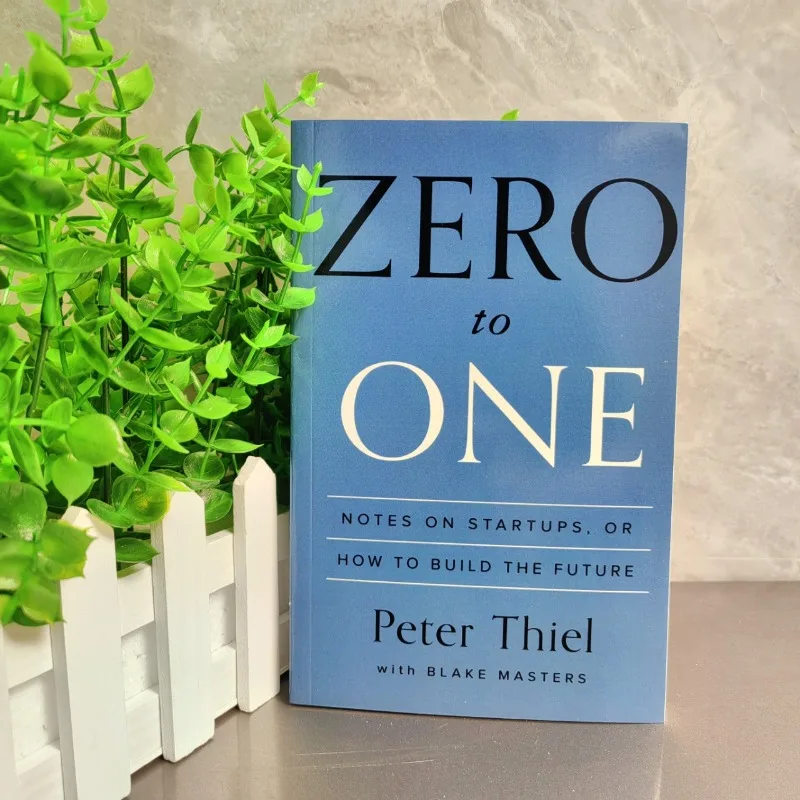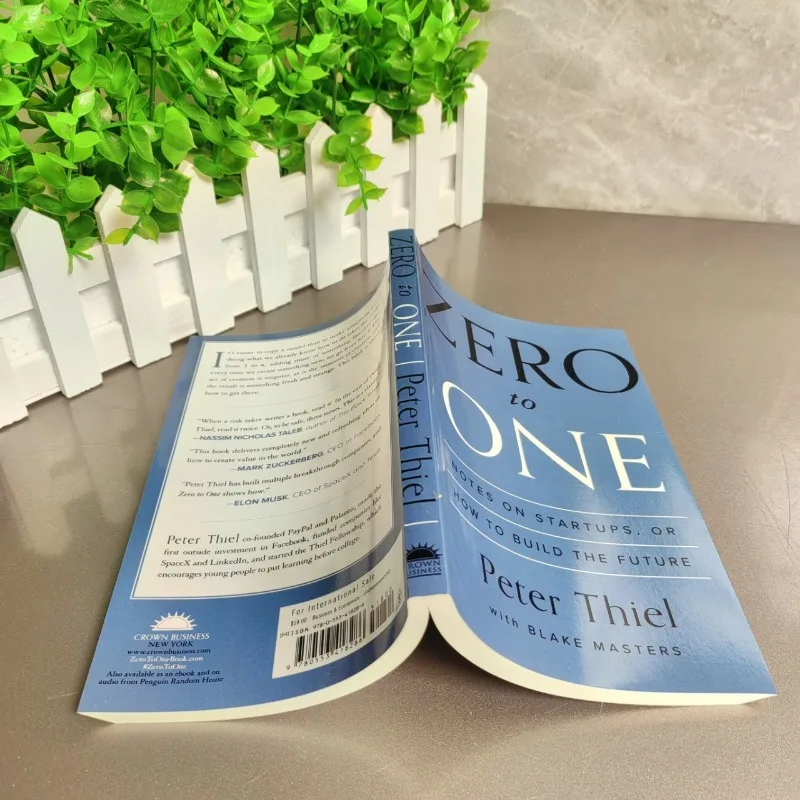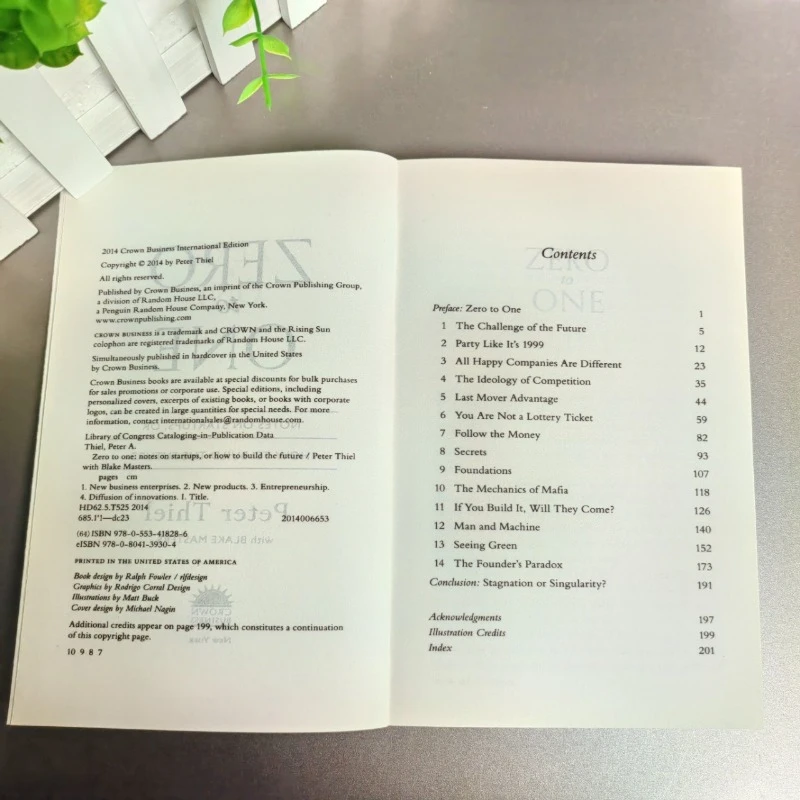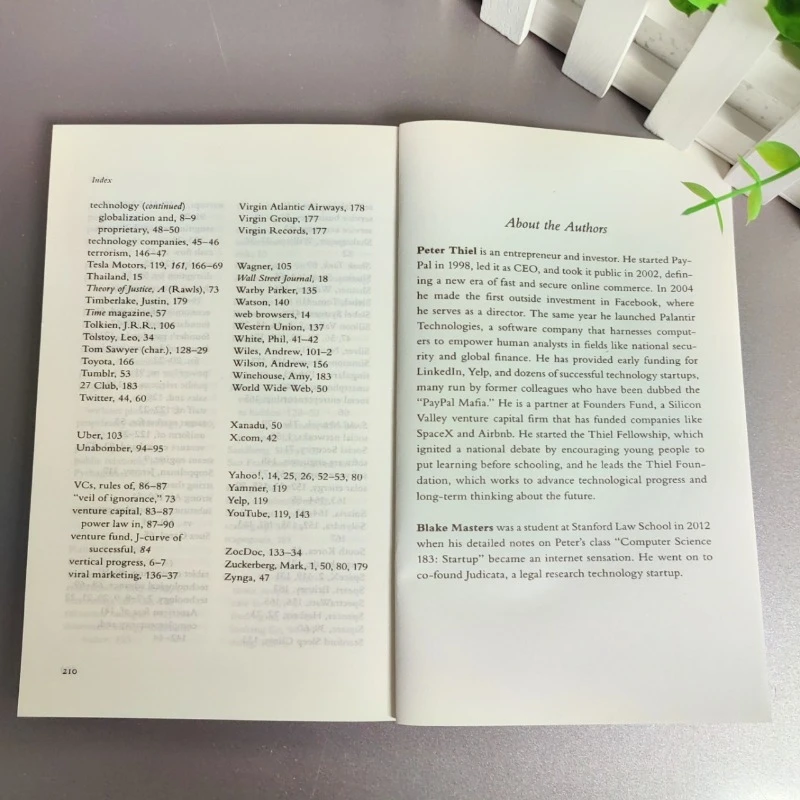Skip to product information


Zero To One de Peter Thiel con notas de Blake Masters en Startups Cómo construir el futuro Incentivar Libros Livros
£8.18
SPECIFICATIONS
Age: Teen & Young Adult
Author: Peter ThielPayPal
Brand Name: NoEnName_Null
Choice: yes
Condition: New
Hign-concerned Chemical: None
Language: English
Origin: Mainland China
semi_Choice: yes
Zero to One "- Peter Thiel's Entrepreneurial Philosophy
Author: Peter Thiel, founder of PayPal and early investor in Facebook
Publication time: 2014
Core theme: How to build monopolistic enterprises and create new markets (rather than getting caught up in competition).
Overview of Core Content
1. From 0 to 1 vs. from 1 to N
From 0 to 1: Create new things (such as Tesla, Airbnb).
From 1 to N: Copy existing patterns (such as ordinary manufacturing, homogeneous competition).
Core viewpoint: True progress comes from innovation (vertical progress), rather than global replication (horizontal progress).
2. Characteristics of monopolistic enterprises
Thiel believes that successful companies should pursue monopoly (rather than competition) and possess the following characteristics:
Technological advantage (10 times better than existing solutions)
Network effect (the more users there are, the greater the value, such as Facebook)
Economies of scale (diminishing marginal costs, such as Google search)
Brand barriers (such as Apple's ecosystem)
3. Competition is a game for losers
In perfectly competitive markets, profits tend to approach zero (such as catering and retail).
Enterprises should avoid "red ocean competition" and instead establish unique barriers.
4. Key issues in entrepreneurship
Thiel poses 7 key questions that entrepreneurs must answer:
Engineering question: Can you make a tenfold improvement in technology?
Timing question: Is now the right time?
Monopoly problem: Can you start from a small market and dominate?
Team Question: Do you have a suitable team?
Channel issue: How to sell and deliver products?
Persistent question: What will the market be like in 10 years?
Secret question: What truth have you discovered that others have overlooked?
5. Power Law
A few key decisions determine the success or failure of a company, such as investments and market choices.
Entrepreneurs should focus on the most promising opportunities rather than dispersing resources.
6. Outlook on the Future: Optimistic vs. Pessimistic
Clear optimism (such as the United States from 1950 to 1970): believing that the future will be better and actively building (such as the moon landing program).
Unclear optimism (such as modern finance): blind faith in progress, but lack of plans (such as foam economy).
Thiel's suggestion: Entrepreneurs should become clear optimists and use technology to create the future.
Suitable for readers
Entrepreneurs: Learn how to establish monopolistic enterprises.
Investors: Understand how to identify disruptive opportunities.
Technology practitioners: master innovative thinking.
Students/professionals: cultivate non consensus thinking skills.
Controversy and Criticism
Is monopoly ethical?
Thiel believes that monopolies drive progress, but critics point out that monopolies may suppress competition (such as the antitrust controversies of Google and Amazon).
Overly idealized
Innovation from 0 to 1 is extremely difficult, and most companies still need to optimize from 1 to N.
Neglecting social impact
The book rarely discusses the social responsibility issues of technology companies.
further reading
Eric Ries: How to validate innovation at low cost.
The Innovator's Dilemma "(Clayton Christensen): Why Big Companies Miss Disruptive Innovation.
Black Swan (Nassim Taleb): How to deal with uncertainty.
summarize
The core idea of Zero to One is:
✅ Innovation is more important than competition - finding the 'secrets' that others overlook.
✅ Monopoly is the goal - to avoid homogeneous competition.
✅ The future is shaped by entrepreneurs - using technology to create a new world.
This book is known as the "Silicon Valley Entrepreneurship Bible" and is suitable for anyone who hopes to break conventions and create the future to read. The Chinese version is published by CITIC Press.





Author: Peter Thiel, founder of PayPal and early investor in Facebook
Publication time: 2014
Core theme: How to build monopolistic enterprises and create new markets (rather than getting caught up in competition).
Overview of Core Content
1. From 0 to 1 vs. from 1 to N
From 0 to 1: Create new things (such as Tesla, Airbnb).
From 1 to N: Copy existing patterns (such as ordinary manufacturing, homogeneous competition).
Core viewpoint: True progress comes from innovation (vertical progress), rather than global replication (horizontal progress).
2. Characteristics of monopolistic enterprises
Thiel believes that successful companies should pursue monopoly (rather than competition) and possess the following characteristics:
Technological advantage (10 times better than existing solutions)
Network effect (the more users there are, the greater the value, such as Facebook)
Economies of scale (diminishing marginal costs, such as Google search)
Brand barriers (such as Apple's ecosystem)
3. Competition is a game for losers
In perfectly competitive markets, profits tend to approach zero (such as catering and retail).
Enterprises should avoid "red ocean competition" and instead establish unique barriers.
4. Key issues in entrepreneurship
Thiel poses 7 key questions that entrepreneurs must answer:
Engineering question: Can you make a tenfold improvement in technology?
Timing question: Is now the right time?
Monopoly problem: Can you start from a small market and dominate?
Team Question: Do you have a suitable team?
Channel issue: How to sell and deliver products?
Persistent question: What will the market be like in 10 years?
Secret question: What truth have you discovered that others have overlooked?
5. Power Law
A few key decisions determine the success or failure of a company, such as investments and market choices.
Entrepreneurs should focus on the most promising opportunities rather than dispersing resources.
6. Outlook on the Future: Optimistic vs. Pessimistic
Clear optimism (such as the United States from 1950 to 1970): believing that the future will be better and actively building (such as the moon landing program).
Unclear optimism (such as modern finance): blind faith in progress, but lack of plans (such as foam economy).
Thiel's suggestion: Entrepreneurs should become clear optimists and use technology to create the future.
Suitable for readers
Entrepreneurs: Learn how to establish monopolistic enterprises.
Investors: Understand how to identify disruptive opportunities.
Technology practitioners: master innovative thinking.
Students/professionals: cultivate non consensus thinking skills.
Controversy and Criticism
Is monopoly ethical?
Thiel believes that monopolies drive progress, but critics point out that monopolies may suppress competition (such as the antitrust controversies of Google and Amazon).
Overly idealized
Innovation from 0 to 1 is extremely difficult, and most companies still need to optimize from 1 to N.
Neglecting social impact
The book rarely discusses the social responsibility issues of technology companies.
further reading
Eric Ries: How to validate innovation at low cost.
The Innovator's Dilemma "(Clayton Christensen): Why Big Companies Miss Disruptive Innovation.
Black Swan (Nassim Taleb): How to deal with uncertainty.
summarize
The core idea of Zero to One is:
✅ Innovation is more important than competition - finding the 'secrets' that others overlook.
✅ Monopoly is the goal - to avoid homogeneous competition.
✅ The future is shaped by entrepreneurs - using technology to create a new world.
This book is known as the "Silicon Valley Entrepreneurship Bible" and is suitable for anyone who hopes to break conventions and create the future to read. The Chinese version is published by CITIC Press.








